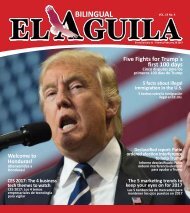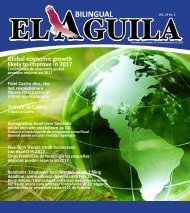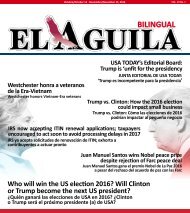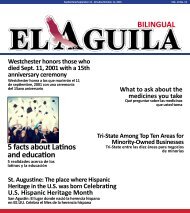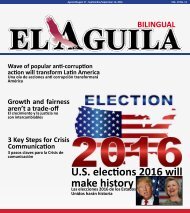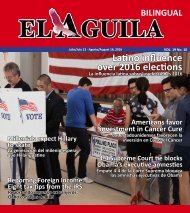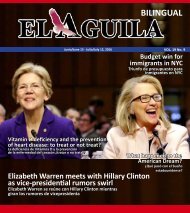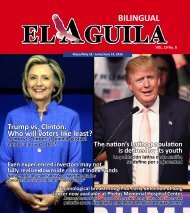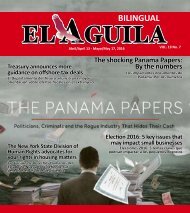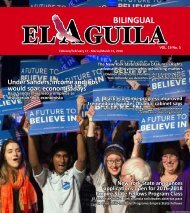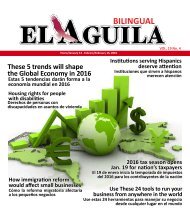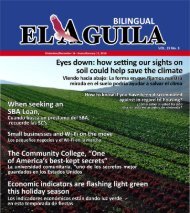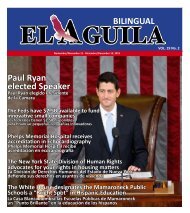El Aguila Magazine – March 16, 2016
You also want an ePaper? Increase the reach of your titles
YUMPU automatically turns print PDFs into web optimized ePapers that Google loves.
<strong>El</strong> <strong>Aguila</strong> Marzo/<strong>March</strong> 17 - Abril/April 12, 20<strong>16</strong> PRIMER PLANO/FRONT PAGE<br />
3<br />
Por Alfredo Estrada<br />
<strong>El</strong> presidente Obama quiere ser el<br />
primer presidente en visitar La<br />
Habana desde Calvin Coolidge<br />
en 1928, y planea ir el 21 de marzo, un<br />
día después de que los Rolling Stones<br />
se presenten allí.<br />
Pero el hombre que quiere hacer historia<br />
por ir a Cuba necesita una lección de<br />
la historia de Cuba.<br />
La apertura a Cuba hace más de un año<br />
fue sacada de una novela de Graham<br />
Greene, con reuniones muy secretas,<br />
espías y personajes oscuros, y aun con<br />
la intervención divina por el Vaticano.<br />
Lo acepté al igual que muchos cubanoamericanos.<br />
Las relaciones entre mis<br />
dos países han permanecido congeladas<br />
desde la Guerra Fría, y debió haberse<br />
descongelado desde hace mucho<br />
tiempo.<br />
<strong>El</strong> planteamiento inicial de Obama fue<br />
sagaz. Acordó eliminar a Cuba de la<br />
lista de terroristas y abrir una embajada.<br />
Sin embargo, estos cambios fueron<br />
más simbólicos que sustantivos. Cuba<br />
no puede permitirse el lujo de proporcionar<br />
hojas de pacientes en hospitales<br />
estatales, mucho menos terroristas de<br />
fondos, y en la Sección de Intereses de<br />
EE.UU. era una embajada en todo menos<br />
en nombre. Concesiones reales, tales<br />
como el levantamiento del embargo,<br />
vendrían sólo si Cuba abría su sociedad<br />
represiva, que permanece atascada en<br />
la era soviética.<br />
Obama luego colgaba una deliciosa zanahoria<br />
para los hermanos geriátricos<br />
Castro, ofreciendo visitar la isla si se<br />
lograban avances en materia de derechos<br />
humanos.<br />
Sin embargo, lo contrario es cierto. De<br />
hecho, según lo informado por el diario<br />
The Washington Post, en 2015 se<br />
registraron más de 8.6<strong>16</strong> detenciones<br />
políticas documentadas en Cuba, en<br />
comparación con 2.074 detenciones en<br />
2010 y 4.123 en 2011. Christian Solidarity<br />
Worldwide documentó 2.300<br />
violaciones de la libertad religiosa en<br />
comparación con 220 en 2014. los Castro<br />
había liberado a 53 prisioneros políticos<br />
como un gesto de diciembre de<br />
2014, pero la mayoría de ellos han sido<br />
detenidos de nuevo, y cinco han sido<br />
condenados a penas de prisión a largo<br />
plazo. Y Cuba aún tiene que permitir<br />
una visita del Comité Internacional<br />
de la Cruz Roja o de los monstruos de<br />
los derechos humanos de las Naciones<br />
Unidas, como lo había prometido.<br />
Además, los cubanos están abandonando<br />
la isla en cifras récord, a menudo<br />
a través de México. Temen que los<br />
EE.UU. pondrá fin a la política de “pies<br />
secos-pies mojados”, pero también<br />
muestra que las cosas no están mejor<br />
en casa.<br />
Entonces ¿por qué Obama va a La Habana,<br />
si no es para tachar un elemento<br />
más de su lista “rhymes with buckets?<br />
Barack Obama, ¿nuestro hombre en La Habana?<br />
Tal vez su amigo Jay Z le dijo que sería<br />
“divertido”, como Obama afirmó<br />
ligeramente, o tal vez quiera visitar la<br />
casa de Ernest Hemingway, al igual<br />
que otros turistas estadounidenses, o<br />
tener una sesión de fotos con Fidel en<br />
familia, como el Papa convertido en<br />
estrella.<br />
Según la Casa Blanca, Obama sólo se<br />
reunirá con Raúl el hermano de Fidel,<br />
y asistirá a un partido de exhibición<br />
de los Tampa Rays contra el equipo<br />
nacional de béisbol de Cuba.<br />
Salvo hay otra razón. <strong>El</strong> Asesor Adjunto<br />
de Seguridad Nacional Ben<br />
Rhodes dio una pista cuando dijo, “la<br />
regla principal de nuestra política de<br />
Cuba ... sigue siendo la adopción de<br />
medidas que mejoren la vida de los<br />
cubanos.”<br />
Pero a lo largo de la historia, los esfuerzos<br />
estadounidenses para mejorar<br />
la vida del pueblo cubano, a menudo<br />
bien intencionados si rara vez desinteresados,<br />
han dado lugar a fracasos<br />
como la Bahía de Cochinos.<br />
Rhodes nota que la visita de Obama<br />
será bastante diferente del viaje de Silent<br />
Cal a La Habana en 1928, pero<br />
hay similitudes alarmantes. Coolidge<br />
fue a apuntalar el régimen corrupto y<br />
brutal de Gerardo Machado, que hizo<br />
más que nadie para destruir las instituciones<br />
de la república cubana. Pero<br />
fracasó, y Machado fue expulsado en<br />
una revuelta espantosa en 1933 en el<br />
que turbas sedientas de sangre recorrían<br />
las calles de La Habana y secuaces<br />
del dictador fueron colgados de<br />
las farolas. Hemingway estaba allí,<br />
y él escribió sobre él en “Tener y no<br />
tener.<br />
<strong>El</strong> sucesor de Machado fue escogido<br />
por el embajador de Estados Unidos,<br />
Sumner Welles. Era un sargento oscuro<br />
llamado Fulgencio Batista, que<br />
dirigió un cuartelazo que terminó con<br />
la democracia cubana, gobernando<br />
con eficacia hasta que Castro llegó al<br />
poder en 1959.<br />
Castro fue otra apuesta perdedora.<br />
Los estudiantes de la historia de Cuba<br />
saben que hacia el final de la revolución,<br />
que fue respaldada por EE.UU.,<br />
el Castro no derrotó militarmente a<br />
Batista, pero escondidos en las montañas,<br />
dando entrevistas a la prensa<br />
“Trumpish” por reporteros “fanboys”<br />
como Herbert Matthews, del The<br />
New York Times. Batista tiró la toalla<br />
sólo cuando los EE.UU. retiró su<br />
apoyo y dejó de enviar armas y municiones.<br />
Los cubanos tienen una larga memoria.<br />
Era el apoyo a matones venales<br />
como Machado y Batista, alimentado<br />
por los intereses comerciales de Estados<br />
Unidos, que dio lugar al virulento<br />
antiamericanismo que Castro fue capaz<br />
de explotar cuando le dio vuelta<br />
a las mesas en EE.UU., y declaró ser<br />
un comunista.<br />
Ningún <strong>–</strong> Drama Obama ha causado<br />
un alboroto, ofreciendo una zanahoria<br />
sin palo. Si su visita permite<br />
a los hermanos Castro, que pronto<br />
se unirán a Machado y Batista en el<br />
basurero de la historia, entonces será<br />
un deja vu de nuevo.<br />
A lo mejor es un juego de azar, pero<br />
los EE.UU. perdió en grande cuan-<br />
By Alfredo Estrada<br />
President Obama wants to be the<br />
first sitting president to visit Havana<br />
since Calvin Coolidge in 1928,<br />
and plans to go on <strong>March</strong> 21, a day after<br />
the Rolling Stones play there.<br />
But the man who wants to make history<br />
by going to Cuba needs a lesson in Cuban<br />
history.<br />
The opening to Cuba just over a year<br />
ago was out of a novel by Graham<br />
Greene, with hush-hush meetings, spies<br />
and shady characters, and even divine<br />
intervention by the Vatican. I welcomed<br />
it, as did many Cuban-Americans. Relations<br />
between my two countries have<br />
remained frozen since the Cold War,<br />
and a thaw is long overdue.<br />
Obama’s initial approach was a shrewd<br />
one. He agreed to remove Cuba from<br />
the terrorist watch list and open an embassy.<br />
But these changes were more<br />
symbolic than substantive. Cuba can’t<br />
afford to provide sheets to patients in<br />
state-run hospitals, much less fund terrorists,<br />
and the U.S. Interests Section<br />
was an embassy in all but name. Real<br />
concessions, such as lifting the embargo,<br />
would come only if Cuba opened<br />
up its repressive society, which remains<br />
mired in the Soviet era. Obama then<br />
dangled a delicious carrot to the geriatric<br />
Castro brothers, offering to visit the<br />
island if progress was made on human<br />
rights.<br />
But the reverse is true. In fact, as reported<br />
by The Washington Post, in 2015 there<br />
were more than 8,6<strong>16</strong> documented political<br />
arrests in Cuba, as compared to<br />
2,074 arrests in 2010 and 4,123 in 2011.<br />
Christian Solidarity Worldwide documented<br />
2,300 violations of religious<br />
freedom compared to 220 in 2014. The<br />
Castros had released 53 political prisoners<br />
as a gesture in December 2014, but<br />
most of them have been re-arrested, and<br />
five have been given long-term prison<br />
sentences. And Cuba has yet to allow<br />
a visit by the International Committee<br />
of the Red Cross or U.N. human rights<br />
monsters, as it had promised.<br />
In addition, Cubans are leaving the island<br />
in record numbers, often by way<br />
do tiró los dados con Machado, Batista<br />
y Castro.Rhodes dijo que Obama<br />
se reuniría con disidentes en La<br />
Habana, pero el secretario de Estado<br />
John Kerry acaba de cancelar su viaje<br />
de calentamiento, al parecer debido<br />
a desacuerdos sobre con quiénes<br />
se reunirá, según el diario Los Angeles<br />
Times. <strong>El</strong> espectáculo de los<br />
EE.UU. regateando sobre esto es<br />
muy preocupante, y crea un terrible<br />
precedente para futuras negociaciones<br />
con el gobierno cubano.<br />
Barack Obama, our man in Havana?<br />
of Mexico. They fear the U.S. will end<br />
the “wet foot-dry foot” policy, but it also<br />
shows things are not getting better at<br />
home.<br />
Then why is Obama going to Havana,<br />
other than scratching one more item<br />
from his rhymes- with-bucket list?<br />
Perhaps his pal Jay Z told him it would<br />
be “fun,” as Obama flippantly claimed,<br />
or maybe he wants to visit Ernest<br />
Hemingway’s house, like other American<br />
tourists, or have a photo op with Fidel<br />
en familia, like the star-struck Pope.<br />
According to the White House, Obama<br />
will only meet with Fidel’s brother Raúl,<br />
and attend an exhibition game of the<br />
Tampa Rays against the Cuban national<br />
baseball team.)<br />
Except there’s another reason. Deputy<br />
National Security Advisor Ben Rhodes<br />
gave a clue when he said, “the guiding<br />
principle of our Cuba policy ... remains<br />
taking steps that will improve the lives<br />
of the Cuban people.”<br />
But throughout history, American<br />
efforts to improve the lives of the Cuban<br />
people, often well-meaning if rarely disinterested,<br />
have led to fiascos like the<br />
Bay of Pigs.<br />
Rhodes notes that Obama’s visit will be<br />
rather different than Silent Cal’s trip to<br />
Havana in 1928, but there are alarming<br />
similarities. Coolidge went to prop up<br />
the corrupt, brutal regime of Gerardo<br />
Machado, who did more than anyone<br />
else to destroy the institutions of the Cuban<br />
republic. But it backfired, and Machado<br />
was thrown out in a gruesome revolt<br />
in 1933 in which bloodthirsty mobs<br />
roamed the streets of Havana and the<br />
dictator’s henchmen were hung from<br />
streetlights. Hemingway was there, and<br />
he wrote about it in “To Have and Have<br />
Not.”<br />
Machado’s successor was handpicked<br />
by the American ambassador, Sumner<br />
Welles. He was an obscure sergeant<br />
named Fulgencio Batista, who led a<br />
barracks revolt that ended Cuban democracy,<br />
effectively ruling until Castro<br />
swept into power in 1959.<br />
No vaya a Cuba, Sr. Presidente.<br />
Estrada nació en Cuba y se graduó<br />
de la Universidad de Harvard antes<br />
de practicar leyes y fundar HISPA-<br />
NIC <strong>Magazine</strong>. Con base en Austin,<br />
en este momento es el editor de<br />
LATINO <strong>Magazine</strong> y el autor de la<br />
novela “Bienvenido a La Habana,<br />
señor Hemingway” y el libro factual<br />
“La Habana: autobiografía de<br />
una ciudad”.<br />
Fuente: The Hill<br />
Castro was another losing bet. Students<br />
of Cuban history know that toward the<br />
end of the revolution, he was backed by<br />
the U.S. Castro did not defeat Batista<br />
militarily, but holed up in the mountains,<br />
giving Trumpish interviews to<br />
fanboy reporters like Herbert Matthews<br />
of The New York Times. Batista threw<br />
in the towel only when the U.S. withdrew<br />
its support and stopped sending<br />
him guns and ammo.<br />
Cubans have long memories. It was<br />
support for venal thugs like Machado<br />
and Batista, fueled by U.S. business<br />
interests, that spawned the virulent anti-<br />
Americanism that Castro was able to<br />
exploit when he turned the tables on the<br />
U.S. and declared himself to be a communist.<br />
No-drama Obama has caused a ruckus<br />
by offering a carrot with no stick. If his<br />
visit enables the Castro brothers, who’ll<br />
soon join Machado and Batista in the<br />
dustbin of history, then it will be deja vu<br />
all over again.<br />
At best it’s a gamble, but the U.S. lost<br />
big when it rolled the dice with Machado,<br />
Batista and Castro.<br />
Rhodes said that Obama would meet<br />
with dissidents in Havana, but Secretary<br />
of State John Kerry just canceled<br />
his warm-up trip, apparently due to<br />
disagreements over which ones he will<br />
meet, according to the Los Angeles Times.<br />
The spectacle of the U.S. haggling<br />
over this is deeply troubling, and creates<br />
a terrible precedent for future negotiations<br />
with the Cuban government.<br />
Don’t go to Cuba, Mr. President.<br />
Estrada was born in Cuba and graduated<br />
from Harvard University before<br />
practicing law and founding HISPA-<br />
NIC <strong>Magazine</strong>. Based in Austin, he is<br />
currently the editor of LATINO <strong>Magazine</strong><br />
and the author of the novel “Welcome<br />
to Havana, Señor Hemingway”<br />
and the nonfiction book “Havana: Autobiography<br />
of a City.”<br />
Source: The Hill



